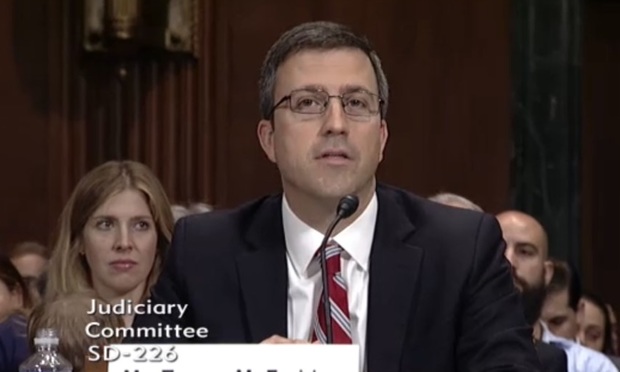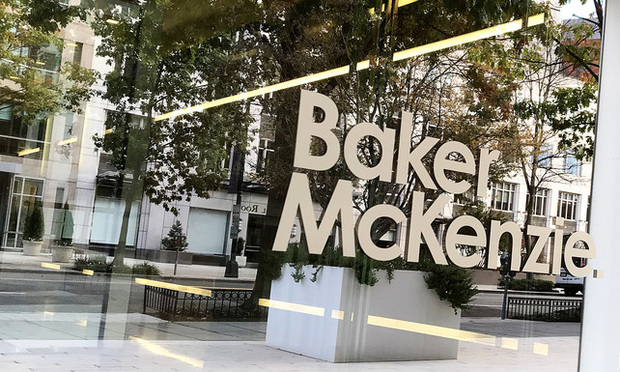Who Is Trevor McFadden? Meet the Judge Assigned the Trump Tax Returns Case
The former Baker McKenzie white-collar partner earlier served on Trump's transition team, vetting potential cabinet picks. "I do not know the President and have never met him in any capacity," McFadden said last year in a case where he was asked to recuse.
July 03, 2019 at 12:59 PM
7 minute read
 Trevor McFadden, appearing for his confirmation hearing in 2017. Photo: Senate Judiciary
Trevor McFadden, appearing for his confirmation hearing in 2017. Photo: Senate Judiciary
A federal trial judge in Washington and former Big Law partner who served as an unpaid volunteer on President Donald Trump's presidential transition team will oversee the U.S. House lawsuit that seeks to force the Treasury Department and IRS to disclose several years of the president's tax returns.
The judge, Trevor McFadden, who joined the bench from the Justice Department in 2017, was randomly assigned the case Wednesday. The House filed suit this week, arguing the Trump administration is violating federal law by refusing to turn over Trump's tax returns to the House Ways and Means Committee.
Federal law commands that U.S. tax officials “shall” disclose any private citizen's returns on the request of the committee. Justice Department and Treasury officials contend, in their refusal to comply with a congressional subpoena, that lawmakers are acting outside the scope of their authority.
A dispute about whether McFadden should recuse in an unrelated subpoena case that came before him in 2017 raised questions about his ties to the Trump campaign, which he called “attenuated” and said would not affect his impartiality. He rejected the suggestion in that case, which involved the research firm Fusion GPS, to step down.
“I will evaluate any other real or potential conflict, or relationship that could give rise to an appearance of conflict, on a case-by-case basis and determine appropriate action, with the advice of parties and their counsel, including recusal where necessary,” McFadden said at the time of his nomination to the trial court.
Who is McFadden? Here's a brief snapshot of his career in the law.
>> McFadden is a former Baker McKenzie white-collar partner in Washington who joined the Justice Department in January 2017. He was a leading supervisory attorney in the criminal division at Main Justice, serving there until his appointment by Trump to the Washington federal trial court. At Main Justice, McFadden “was by far the most prolific U.S. government speaker on the anti-corruption circuit in early 2017,” according to a report by the law firm Gibson, Dunn & Crutcher. (McFadden was a summer associate at Gibson Dunn in 2005 and 2006.) McFadden, in various speeches, said prosecutors were committed to “vigorously” enforcing the Foreign Corrupt Practices Act. McFadden was a partner at Baker McKenzie from 2015 to 2017, and he was an associate from 2013 to 2015. McFadden estimated that about 20% of his work at Baker & McKenzie was in litigation. McFadden was an assistant U.S. attorney in Washington from 2009 to 2013. He clerked for Judge Steve Colloton of the U.S. Court of Appeals for the Eighth Circuit in 2006. In 2008, McFadden served as counsel to then-Deputy Attorney General Mark Filip, who now leads the government enforcement defense and international investigations team at Kirkland & Ellis.
 Baker McKenzie offices in Washington, D.C. Photo: Diego M. Radzinschi
Baker McKenzie offices in Washington, D.C. Photo: Diego M. Radzinschi>> McFadden's ties to the Trump presidential campaign were in focus in a subpoena fight that landed in front of McFadden. Lawyers for the research firm Fusion GPS, involved in the production of the so-called “Russia dossier,” were fighting efforts by a Russian businessman to get information from the company. Fusion's attorneys said McFadden should have stepped aside in the dispute. “The lawyers wrote that McFadden's impartiality could be questioned because of his work for President Donald Trump's transition team, his time as second in command at DOJ's Criminal Division and his representation of clients in private practice at Baker & McKenzie,” the National Law Journal reported last year.
McFadden declined the invitation. He called his service on Trump's team “sporadic and unpaid volunteer activity” that “did not make President Trump my employer.” McFadden said: “As a volunteer, I reviewed public-source information about potential cabinet appointees for approximately four hours every few weeks for two to three months.” He continued: “I did not come into contact with Mr. Trump or any of the senior members of his campaign team. In fact, I do not know the President and have never met him in any capacity.” He called his connection to Trump “attenuated.”
McFadden said at one point in the Fusion GPS subpoena case: “Whatever the President's political interests may be, Fusion has not shown that his personal fortune and personal freedom are jeopardized by the discovery dispute in the underlying case. Every president has a wide range of political interests, and President Trump has commented on a plethora of people, companies and cases. It cannot be that the president has a cognizable interest in every matter that has the potential to indirectly vindicate his public comments.”
>> McFadden recently said the U.S. House doesn't have legal “standing” to challenge how Trump is paying for the administration's border wall. “Few ideas are more central to the American political tradition than the doctrine of separation of powers,” McFadden wrote in the opening lines of his ruling. “Our Founders emerged from the Revolution determined to establish a government incapable of repeating the tyranny from which the Thirteen Colonies escaped. They did so by splitting power across three branches of the federal government and by providing each the tools required to preserve control over its functions.” The judge continued later: “While the Constitution bestows upon members of the House many powers, it does not grant them standing to hale the executive branch into court claiming a dilution of Congress's legislative authority. The court therefore lacks jurisdiction to hear the House's claims and will deny its motion.” Lawyers for the House are challenging McFadden's ruling on appeal.
>> McFadden got a call from the White House—about his candidacy for the trial bench—shortly after arriving at the Justice Department. “On March 2, 2017, I was contacted by the White House Counsel's Office and informed that I was one of the candidates being considered to fill a judicial vacancy on the United States District Court of the District of Columbia. Since that time, I have been in contact with officials from the White House Counsel's Office and the Office of Legal Policy at the Department of Justice,” McFadden said in a questionnaire submitted to the Senate Judiciary Committee. McFadden said in 2017 that he had been a member of the Federalist Society since 2003. He also served as co-chair of the Washington chapter of the University of Virginia Federalist Society Alumni. McFadden graduated from the University of Virginia School of Law in 2006. “I joined the Federalist Society as a law student because the group sponsored debates on important legal issues and I was interested in going on the group's annual trip to the Supreme Court,” McFadden told senators at the time of his nomination. He was asked whether he “agreed” with the views of the Federalist Society. His response: “I have not studied the views espoused by the Federalist Society. In any event, it would be improper for me to state a personal belief about matters that may come before me. If confirmed as a judge, I pledge to apply binding precedent to the facts before me.”
Read more:
READ: US House Asks Judge to Force Disclosure of Trump's Tax Returns
House Lawyers Rebuff Trump's 'Disdain' for Oversight, Urge Court to Uphold Subpoena
Trump's Lawyers Drag Justices Into DC Circuit Subpoena Fight
DC Circuit Judges Rao, Millett and Tatel Will Hear Trump Case July 12
Judge: House Lacks Standing to Sue Trump Over Border Wall Funding
This content has been archived. It is available through our partners, LexisNexis® and Bloomberg Law.
To view this content, please continue to their sites.
Not a Lexis Subscriber?
Subscribe Now
Not a Bloomberg Law Subscriber?
Subscribe Now
NOT FOR REPRINT
© 2025 ALM Global, LLC, All Rights Reserved. Request academic re-use from www.copyright.com. All other uses, submit a request to [email protected]. For more information visit Asset & Logo Licensing.
You Might Like
View All
RFK Jr. Will Keep Affiliations With Morgan & Morgan, Other Law Firms If Confirmed to DHHS
3 minute read
Read the Document: DOJ Releases Ex-Special Counsel's Report Explaining Trump Prosecutions
3 minute read
3rd Circuit Nominee Mangi Sees 'No Pathway to Confirmation,' Derides 'Organized Smear Campaign'
4 minute read
Judge Grants Special Counsel's Motion, Dismisses Criminal Case Against Trump Without Prejudice
Trending Stories
- 1New York-Based Skadden Team Joins White & Case Group in Mexico City for Citigroup Demerger
- 2No Two Wildfires Alike: Lawyers Take Different Legal Strategies in California
- 3Poop-Themed Dog Toy OK as Parody, but Still Tarnished Jack Daniel’s Brand, Court Says
- 4Meet the New President of NY's Association of Trial Court Jurists
- 5Lawyers' Phones Are Ringing: What Should Employers Do If ICE Raids Their Business?
Who Got The Work
J. Brugh Lower of Gibbons has entered an appearance for industrial equipment supplier Devco Corporation in a pending trademark infringement lawsuit. The suit, accusing the defendant of selling knock-off Graco products, was filed Dec. 18 in New Jersey District Court by Rivkin Radler on behalf of Graco Inc. and Graco Minnesota. The case, assigned to U.S. District Judge Zahid N. Quraishi, is 3:24-cv-11294, Graco Inc. et al v. Devco Corporation.
Who Got The Work
Rebecca Maller-Stein and Kent A. Yalowitz of Arnold & Porter Kaye Scholer have entered their appearances for Hanaco Venture Capital and its executives, Lior Prosor and David Frankel, in a pending securities lawsuit. The action, filed on Dec. 24 in New York Southern District Court by Zell, Aron & Co. on behalf of Goldeneye Advisors, accuses the defendants of negligently and fraudulently managing the plaintiff's $1 million investment. The case, assigned to U.S. District Judge Vernon S. Broderick, is 1:24-cv-09918, Goldeneye Advisors, LLC v. Hanaco Venture Capital, Ltd. et al.
Who Got The Work
Attorneys from A&O Shearman has stepped in as defense counsel for Toronto-Dominion Bank and other defendants in a pending securities class action. The suit, filed Dec. 11 in New York Southern District Court by Bleichmar Fonti & Auld, accuses the defendants of concealing the bank's 'pervasive' deficiencies in regards to its compliance with the Bank Secrecy Act and the quality of its anti-money laundering controls. The case, assigned to U.S. District Judge Arun Subramanian, is 1:24-cv-09445, Gonzalez v. The Toronto-Dominion Bank et al.
Who Got The Work
Crown Castle International, a Pennsylvania company providing shared communications infrastructure, has turned to Luke D. Wolf of Gordon Rees Scully Mansukhani to fend off a pending breach-of-contract lawsuit. The court action, filed Nov. 25 in Michigan Eastern District Court by Hooper Hathaway PC on behalf of The Town Residences LLC, accuses Crown Castle of failing to transfer approximately $30,000 in utility payments from T-Mobile in breach of a roof-top lease and assignment agreement. The case, assigned to U.S. District Judge Susan K. Declercq, is 2:24-cv-13131, The Town Residences LLC v. T-Mobile US, Inc. et al.
Who Got The Work
Wilfred P. Coronato and Daniel M. Schwartz of McCarter & English have stepped in as defense counsel to Electrolux Home Products Inc. in a pending product liability lawsuit. The court action, filed Nov. 26 in New York Eastern District Court by Poulos Lopiccolo PC and Nagel Rice LLP on behalf of David Stern, alleges that the defendant's refrigerators’ drawers and shelving repeatedly break and fall apart within months after purchase. The case, assigned to U.S. District Judge Joan M. Azrack, is 2:24-cv-08204, Stern v. Electrolux Home Products, Inc.
Featured Firms
Law Offices of Gary Martin Hays & Associates, P.C.
(470) 294-1674
Law Offices of Mark E. Salomone
(857) 444-6468
Smith & Hassler
(713) 739-1250








